How Remote Work Improved My Sleep
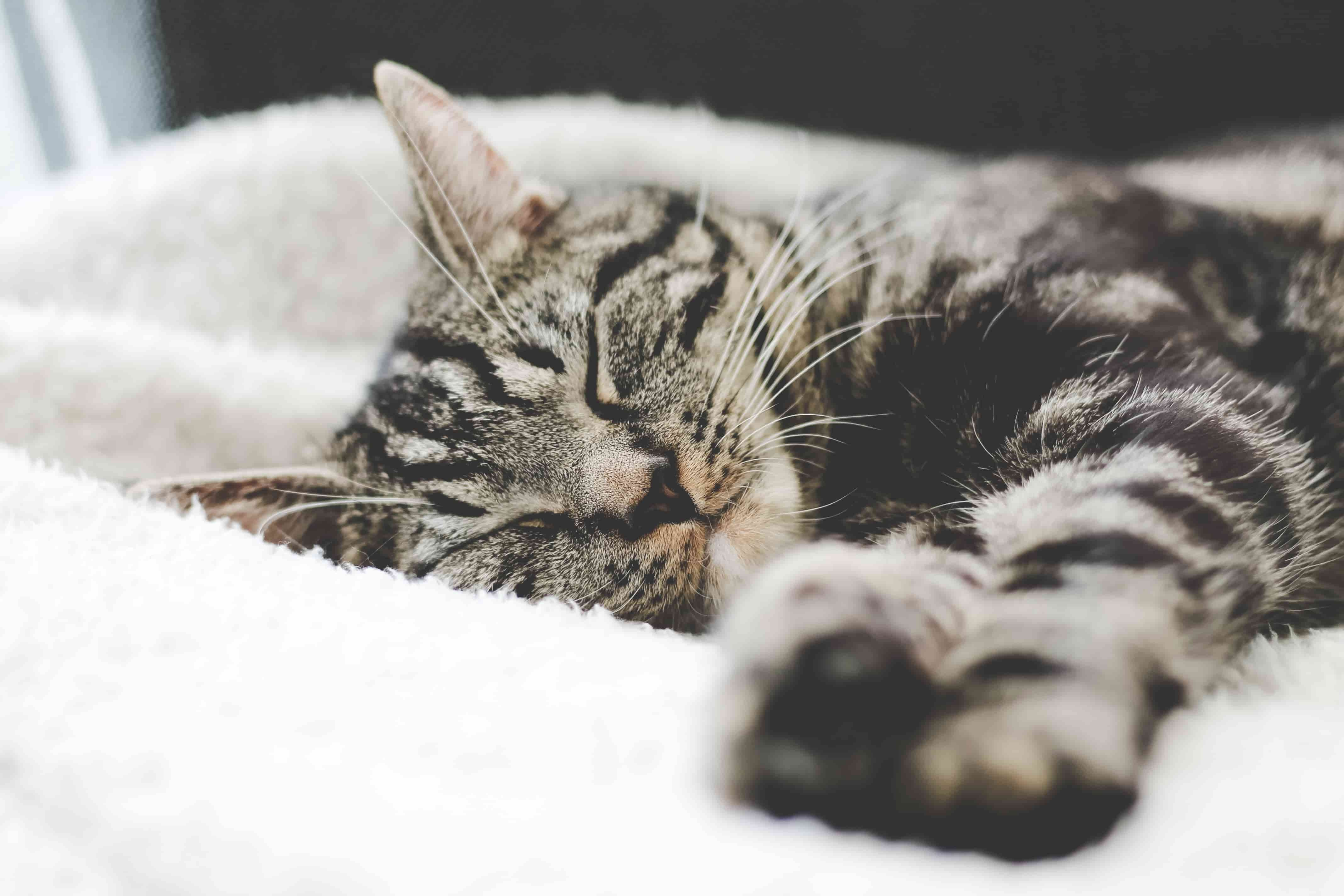

Today a less tech focused article. Rather let’s talk about sleep and it’s importance for us software developers to stay focused and remain performant during the day.
Before starting to work remotely, I did work on-site at a company. That meant getting up at around 6am, breakfast, prepping myself and then drive for 20min to the main town where the company I worked for was located. That’s not too bad, right, people have to drive even up to an hour to get to work sometimes.
The bad thing is the “hard deadline” in the morning at 6am, when the alarm started! Why? Well because you have to get up early :sweat_smile:, but mainly because at that time I usually just averaged around 6 to 6.5 hours of sleep per night. I tried to get to bed before 11pm, but that turned out to be hard as you have dinner, talk with you partner, watch some TV and bam, it’s 11pm.
Sleep less, get more done!
Yep, I definitely had that phase. I still stay up late sometimes after work, to finish that blog post (just as right now) which has been in the drafts for a while, or play around with that side project. But it happens less often (maybe I’m just getting old…and yes, kids play a role there as well :smiley:)
And there was no way around that. When I switched to my last work, I also did some freelancing on the side mainly as a coach giving workshops. What that means is to work 8 hours a day at your job and then in the evening preparing an upcoming workshop or some talk for a conference.
And I think that’s fine and sometimes needed as you have to push harder to get things through and reach some goals. The important part is to keep in mind it’s only for a limited time, and that you have something to balance that. Especially regarding the latter, I usually recovered sleep over the weekend, where I often got up to 10hrs a night. In addition, I did work out a lot, to be able to deal with the additional stress and give the body a way to release it.
Monitoring Health and Sleep
I love all kinds of stats and graphs. I’ve been using Gyroscope for a while. It is kinda an aggregator for metrics all around your body and health, pulling data from various sources such as Fitbit (or others) for fitness related metrics, using RescueTime to track things like productivity when in front of the computer etc. The goal is to give you a complete picture of your body state.
Some people may think it’s crazy, but “what you cannot measure, you cannot improve”, right? Gyroscope also tracks sleep (via it’s sleep AI, or pulled from Fitbit, Apple Watch,…). The main goal is to have metrics and graphs in place that give you a good overview of how you’re performing and whether you should take action to improve things.
So for instance I can see how I perform on average as the weeks pass by..
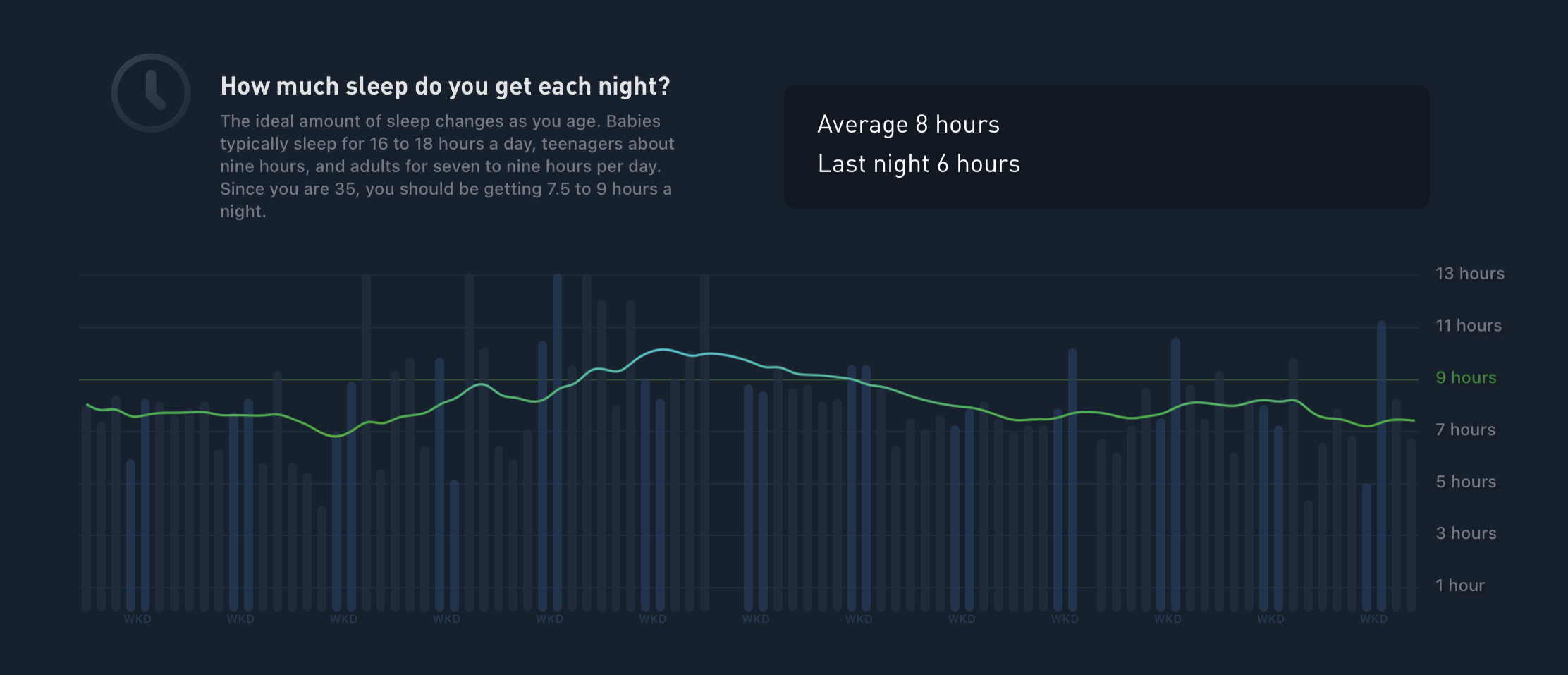
…and understand how my bedtime/wakeup patterns are.
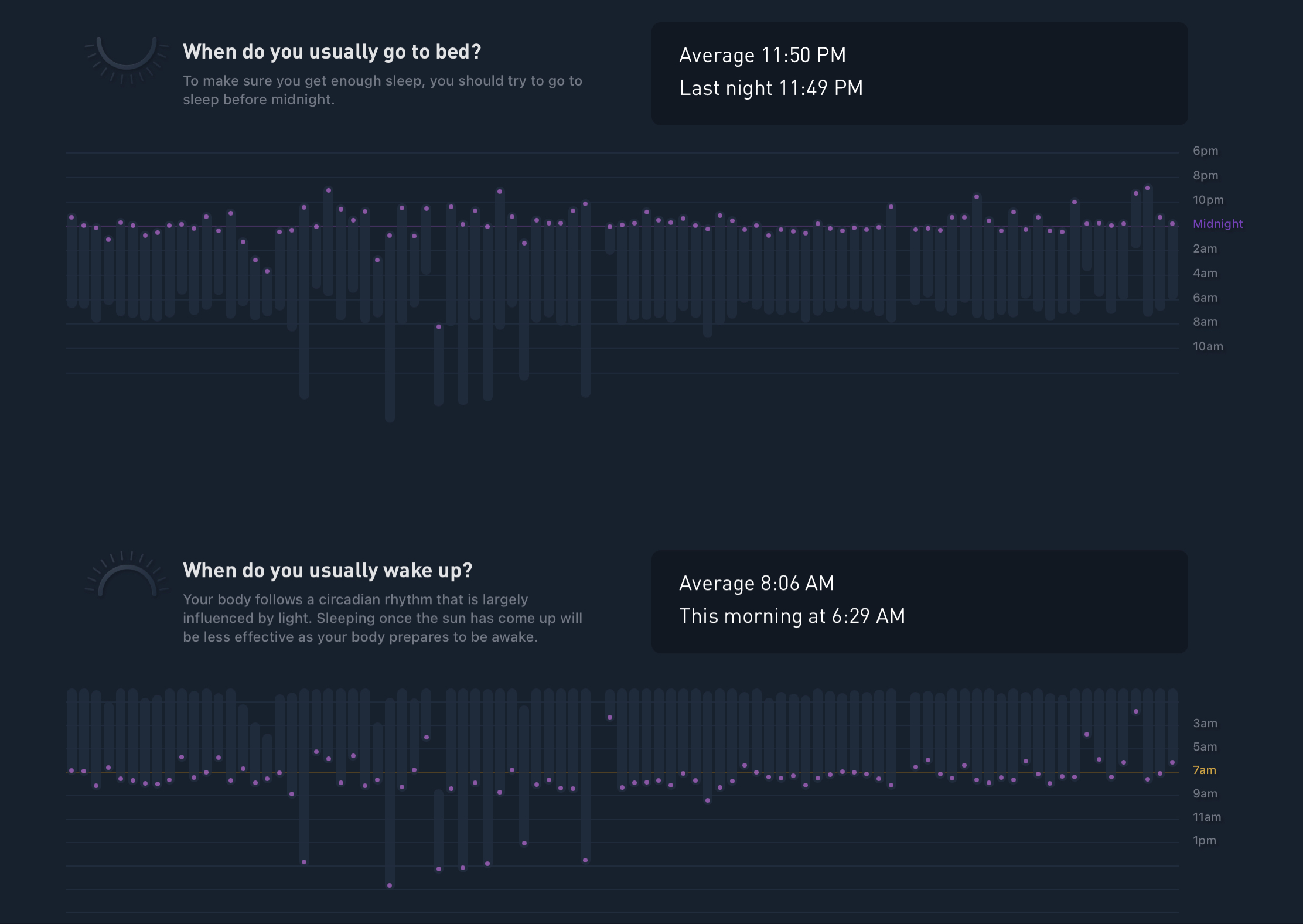
Regular sleep/wakeup schedules help improve the overall sleep quality. And tbh, based on the above, I should probably look into moving my bedtime a bit earlier as it got pretty late recently.
But then looking into the sleep details via Fitbit the amount of deep sleep vs REM look pretty good.
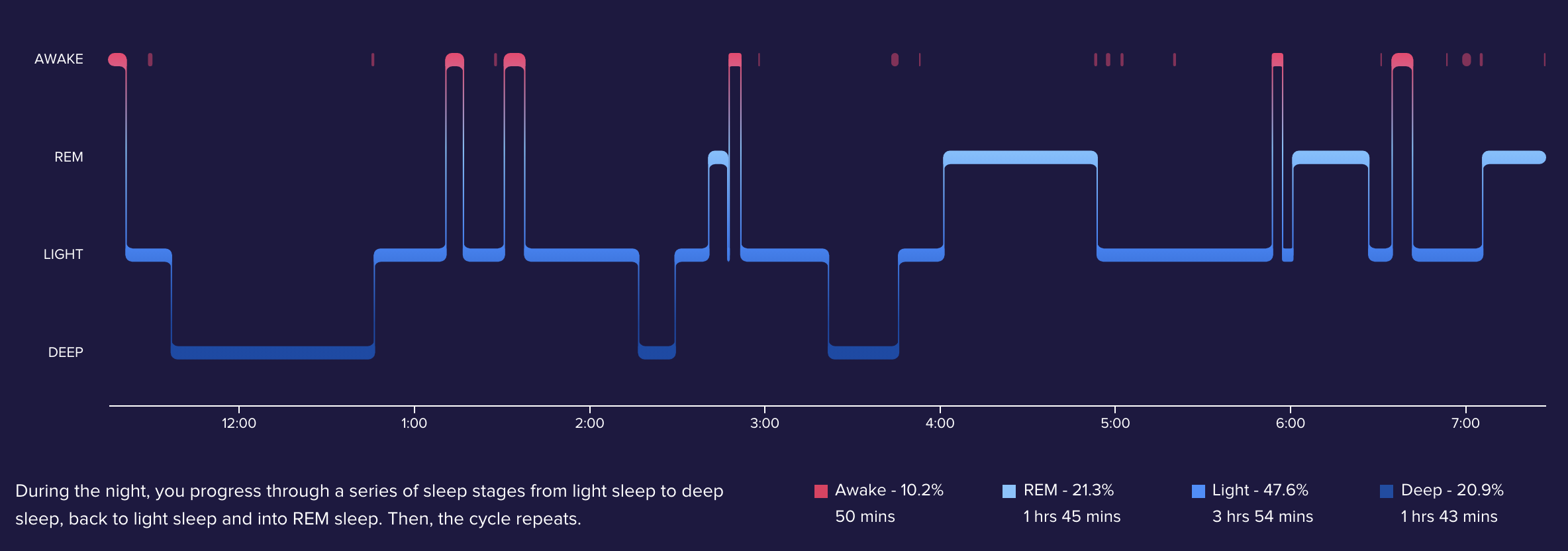
In general, I feel lucky because I rarely have issues with either falling asleep or issues with sleeplessness or being awake at night. (btw, the awake times Fitbit shows in the previous graph are probably either miscalculations or I don’t really notice them consciously)
Obviously, these metrics only help if you’re actually taking action based on them. I see a lot of people use health trackers, but then they don’t do anything about it. Sure, that’s the hard part. The trackers just emphasize where we’re lacking. The actual work still needs to be done :smiley:.
Why are you telling me all this?
Because - as you might already have heard quite often - sleep matters!. It affects your
- performance
- concentration
- creativity
- strength
- …
And that’s what a lot of software development is about, right? We are in front of our machines the whole day, needing to be able to sometimes deeply focus on tasks to be able to tackle them properly.
Here are some good resources if you want to dig deeper. Matthew Walker has some pretty good content:
- Youtube: Joe Rogan Experience #1109 with Matthew Walker
- Podcast: https://peterattiamd.com/matthewwalker4/
How remote work improved my sleep
As I mentioned initially, when I had to go to work on-site, I had to get up at 6am, but still having difficulties getting into bed before 11pm. Hence, my avg sleep time suffered. At the same time, I got pulled out of my sleep by an alarm in the morning, regardless of my sleep phase.
Since I started working remotely
- I still get to bed around 11pm
- I get up in the morning at around 7 to 7:30 am
- I don’t have an alarm set, I get up whenever I wake up (okay, also depends on whether the :baby: wakes me up earlier..that’s reality kicking in :sweat_smile:)
Covid apparently helped as well
Well, this might not be a surprise, given I just mentioned work from home helped me. Covid forced many people to switch to a WFH (Work From Home) scenario.
Matthew Walker talks about it in the podcast I linked before. The exact same effect I experienced has been found in studies to improve the overall sleep of people. There have been various studies, one from the “Current Biology” magazine which published a study about the effect of COVID lockdowns on sleep.
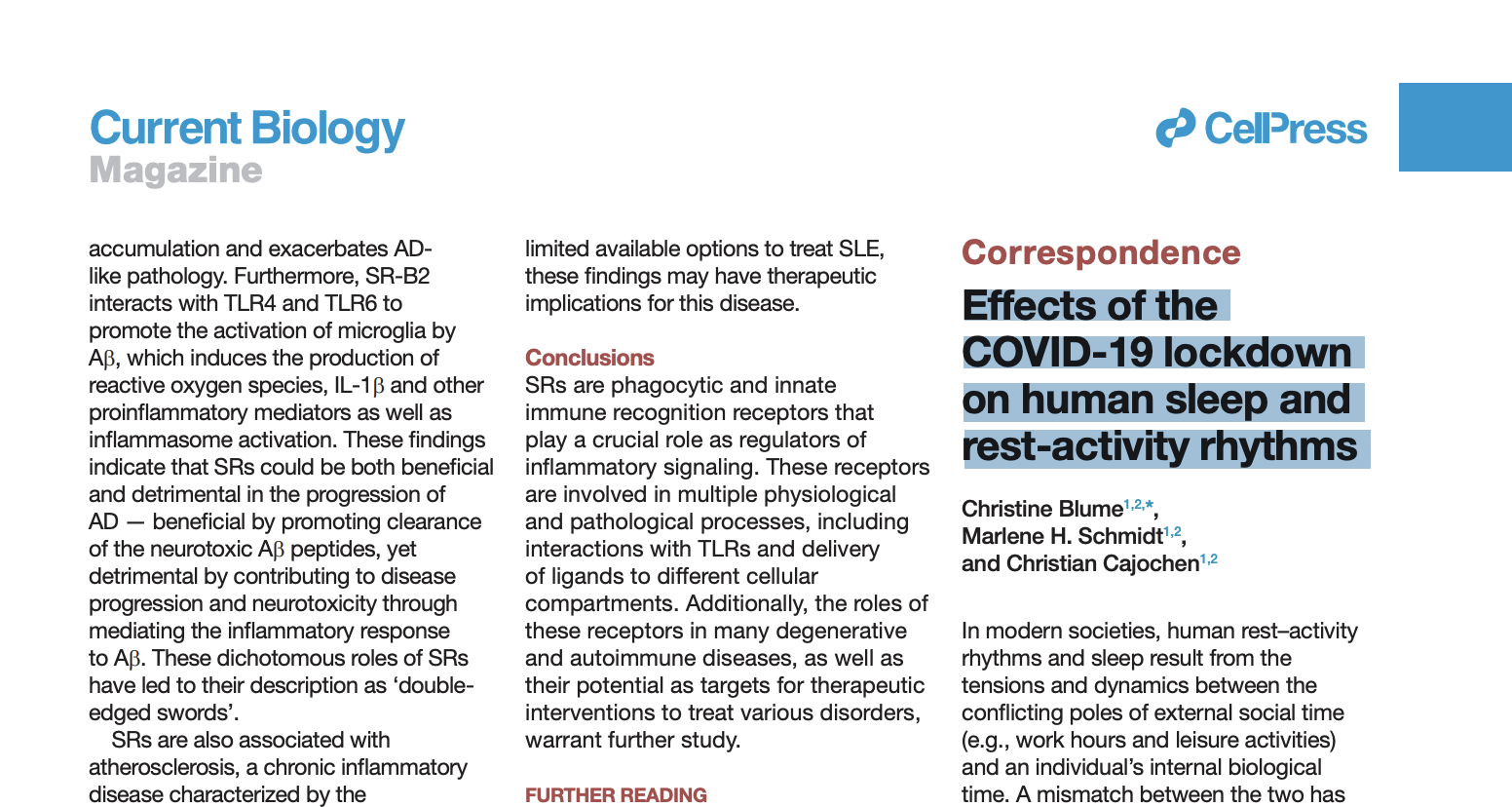
They specifically go into details about the effect of “social jetlag”, sleep duration, and quality. But read yourself:
https://www.cell.com/current-biology/pdf/S0960-9822(20)30837-X.pdf
As also discussed in the podcast, I think we need to be careful with coming to a quick conclusion though. It might have improved sleep for some, for the very same reasons it has helped me in terms of WFH. However, many people have to be afraid of potentially losing their job (or have lost it), about not having regular social interactions and so on. All of which, lead to anxiety and hence bad sleep or sleeplessness.
Conclusion
So to wrap up
- you should care about getting enough sleep, it will help performance overall
- tracking and having metrics in place might help to locate potential issues and highlight areas for improvement
- remote work helps, at least me, in that even though I get to bed late, I still get enough sleep
- having children might make it a bit more difficult sometimes
Also, keep in mind that it might not be that easy. Staying inside whether being forced due to Covid lockdowns or WFH might also have their negative sides like
- less exposure to sunlight
- potentially walk less and less physical activity
- lack of social interactions
- …
But talking in detail about these might be too much for a single article.